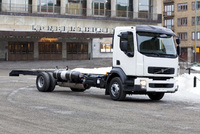Volvo goes with gas in diesel engines

Which fuels will replace oil? Of course, nobody yet knows the answer. However, in order for the manufacturers to be able to offer vehicles that the market will want in the future, strategic decisions have to be made today. Volvo Trucks is investing in a solution that is financially sustainable and that may form a bridge between fossil and renewable fuels - diesel engines running on methane gas.
“We have chosen a route where we combine the diesel engine’s superior efficiency rating with the benefits of gas. This gives us a truck that is significantly more energy-efficient than traditional gas trucks,” says Mats Franzén, Manager Engine Strategy and Planning, Volvo Trucks.
This innovative approach is bound to attract attention in the transport sector, where the gas-powered trucks currently in use have spark plug internal combustion engines adapted for gas operation. “There is a simple logic behind Volvo Trucks’ decision to slightly modify its proven diesel engines,” argues Mats Franzén, Manager Engine Strategy and Planning.
“A diesel engine has a 30 to 40 per cent better efficiency rating than an ordinary spark plug engine running on petrol or an internal combustion engine. Whatever fuels either engine type runs on, the diesel engine is always far more energy-efficient. That’s why all heavy vehicles have diesel engines,” he explains.
One example: With compressed methane gas in the tanks, a gas-powered truck with an internal combustion engine can drive 150-200 kms without refuelling. With the same amount of gas in a truck with a methane diesel engine, the range is twice as long.
Volvo Trucks’ aim is for its trucks to operate on 75% methane gas and 25% diesel in the initial stage. Optimum efficiency is achieved if the methane gas is chilled to -160ºC as, at that temperature, the gas becomes liquid, the volume is reduced and you get twice the amount of fuel. With liquid methane gas in the tank and a fuel consumption of 75% methane gas and 25% diesel, it is now possible to drive more than 500 kms before refuelling.
This means that for transport companies performing long daily transport jobs and returning to the same filling station, Volvo Trucks’ methane diesel technology is already an attractive, environmentally compatible fuel option.
"The technology is constantly developing. We’ll be able to drive 1,000 kms on a tank of liquid gas in the near future,” says Mats Franzén.
At present, the network of filling stations that distribute liquid methane gas is unevenly developed in Europe. There are plenty of filling stations in the UK, while some countries, such as Sweden, have none at all. However, filling stations will soon be built in Sweden’s three largest cities, partly as a result of Volvo Trucks’ drive, which is taking place in close cooperation with gas suppliers in Sweden.
“We're currently in a transition stage. We’re moving from decades of dependence of oil to a society based on renewable fuels,” explains Lars Mårtensson, Volvo Trucks’ Environmental Director. “During this transition period, gas trucks with a methane diesel engine have an obvious advantage. They can run on only diesel, which is practical and safe when filling stations are few and far between.”
A common argument against methane gas is that natural gas has to be used because not enough biogas is produced. Critics argue that replacing one fossil fuel with another is unsatisfactory.
“Using natural gas is one way of getting through this transition period until biogas production has been fully developed. We’d prefer our engines to run on both biodiesel and biogas. That would reduce carbon emissions by almost 80% compared to traditional diesel operation,” explains Lars Mårtensson.
Field testing of methane diesel engines will start in the UK and Sweden during 2010. Potential customers are showing high interest, not least in the public sector, which already makes strict environmental requirements during procurement and plays a key role in driving development forward.
“Our focus on a combination of methane gas and diesel makes it possible to capitalise on all the benefits of a diesel engine, while lowering both costs and emission levels by using methane gas as our main energy source,” concludes Mats Franzén.

